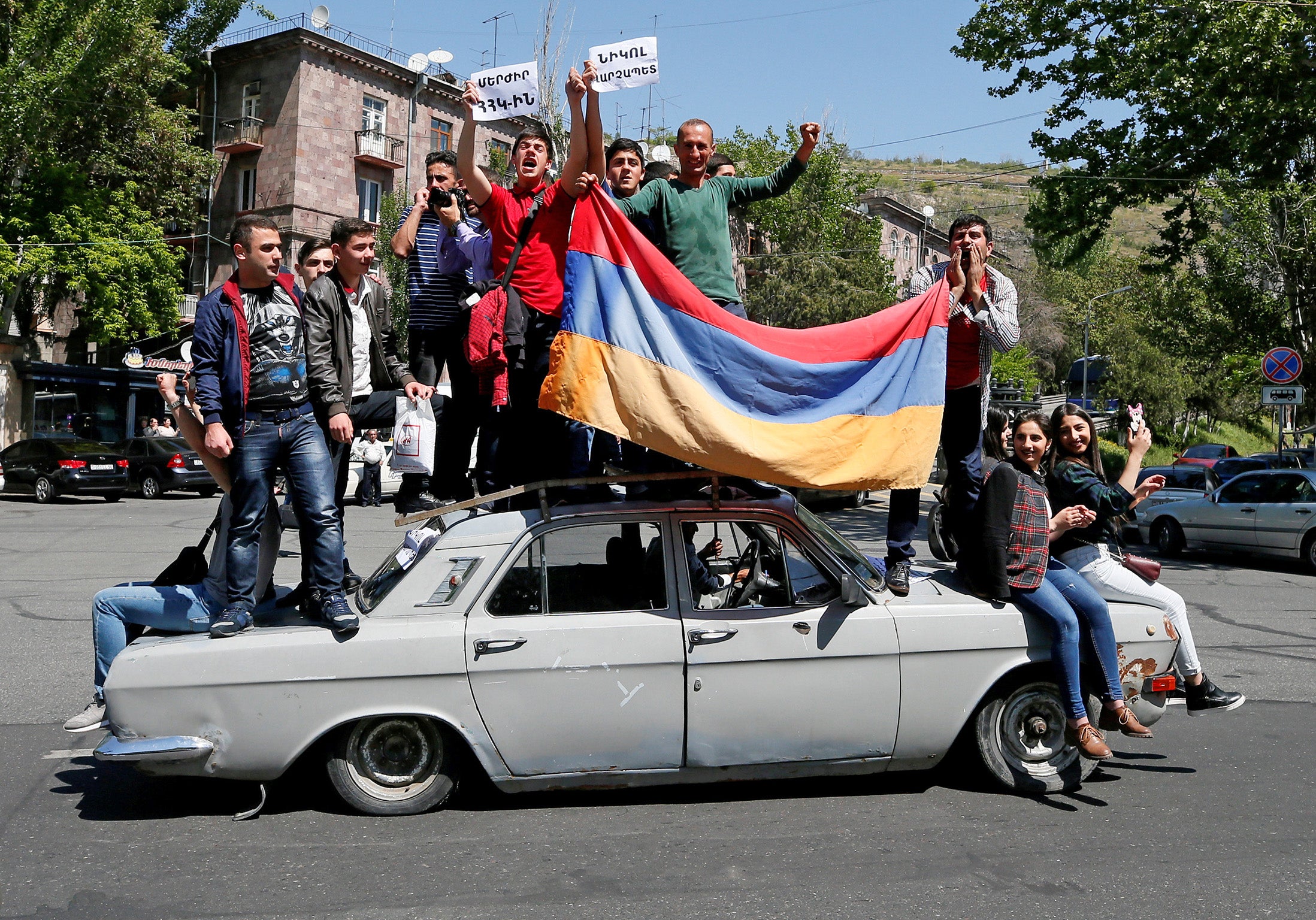Armenia protests: Russia appears to back old regime as uncertainty grows over future government
Parliament due to elect a new leader on 1 May

Your support helps us to tell the story
From reproductive rights to climate change to Big Tech, The Independent is on the ground when the story is developing. Whether it's investigating the financials of Elon Musk's pro-Trump PAC or producing our latest documentary, 'The A Word', which shines a light on the American women fighting for reproductive rights, we know how important it is to parse out the facts from the messaging.
At such a critical moment in US history, we need reporters on the ground. Your donation allows us to keep sending journalists to speak to both sides of the story.
The Independent is trusted by Americans across the entire political spectrum. And unlike many other quality news outlets, we choose not to lock Americans out of our reporting and analysis with paywalls. We believe quality journalism should be available to everyone, paid for by those who can afford it.
Your support makes all the difference.Bloodless and quick, the success of Armenia’s velvet revolution surprised everyone. But the resignation of the country’s longtime leader Serzh Sargsyan on 13 April – accompanied, as it was, by a wild party in the streets of Yerevan – now looks like being but the first chapter of a much longer story.
And as the country falls into constitutional crisis, Russia seems to be monitoring the vacant steering wheel.
On 1 May, Armenia’s parliament will choose a new prime minister – and a general election will likely follow. The protest leader Nikol Pashinyan has insisted he should take charge for the interim, and has rejected any compromise with the government. More than that: he has refused to countenance any collaboration with members of Serzh Sargsyan’s Republican party, who he has characterised as corrupt and illegitimate.
After leading tens of thousands of Armenians onto the streets, there is little Mr Pashinyan lacks in the way of charisma, popular support or momentum. But the former journalist is behind on one key metric: the formal numbers game.
The constitutional balance of power remains with the ruling Republican Party of Armenia, returned with a large majority in last April’s disputed elections. It is unlikely to hand the premiership over without a fight.
The Republican Party had hoped the quick appointment of a new acting prime minister, the former Gazprom official Karen Karapetyan, would be enough to calm the public mood. But Mr Pashinyan has continued to press home his popular advantage, and his supporters appear to be going nowhere. On Friday, he took the protest to Gyumri, Armenia’s second city.
For most of the past fortnight, the Kremlin has played an unusual role of relaxed bystander.
Speaking to journalists on Thursday, presidential spokesman Dmitry Peskov insisted that Russia was not in the least concerned by a revolution against corruption and authoritarian rule in Russia’s backyard.
“The issue is exclusively a domestic Armenian affair,” he said.
But in recent days, Russia has hinted at a new activism. Secret delegations have scuttled in and out of Yerevan, rumoured to have included the presidential chief of staff Vaino. On Thursday, Armenia’s foreign minister was in Moscow. Later that day, Vladimir Putin spoke with acting prime minister Karen Karapetyan.
The readout of that high-level call appeared to be a game changer. The Armenian crisis should be resolved quickly, within the constitution, and “on the basis of the results of the legitimate parliamentary elections held in April 2017”, the Russian president told his counterpart. Mr Putin’s formulation implicitly favoured the old guard so despised by the protest movement.
Almost immediately, the government found new resolve in dealing with Mr Pashinyan’s hardline negotiation stance. On Friday, Mr Karapetyan rejected outright the possibility of talks with the protest leader – describing his absolutist terms as unacceptable.
The confluence of events has suggested to many that the Kremlin has shifted to openly embrace its man on the ground.
“Karapetyan is now seen as a man on a mission, more committed to fulfilling Moscow’s demands than meeting popular Armenian expectations for change,” says Richard Giragosian, director of the Regional Studies Centre, an independent think tank in Yerevan.
The opposition leadership has been careful to distance itself from anti-Russian sentiment.
On various platforms, Mr Pashinyan said he supported economic and military collaboration with Russia, including retaining a Russian army base. He has also insisted the Armenian revolution had little in common with other, anti-Russian colour revolutions.
“This is not a Euromaidan,” he said, referencing the Ukrainian revolution four years ago. “Not a single penny has been given from a foreign agency towards this movement.”
But with Moscow’s bid to counter the protest ascendancy, that neutrality would appear now to be at risk – and with unpredictable consequences.
“Putin and Karapetyan are recklessly misreading the mood on the Armenian street,” says Mr Giragosian. “They are missing the first lesson from the downfall of Serzh Sargsyan: it is dangerous to ignore popular demands for change.”
Join our commenting forum
Join thought-provoking conversations, follow other Independent readers and see their replies
Comments